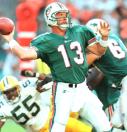
So I go into my local supermarket a while back to hunt and gather and lo! there on the paperback rack is my book. As Martha says, it's a good thing. But alas, I am down on the bottom, wedged between the horoscope books and a romance with a really creepy cover. I curbed my cart, looked around to see that no one was watching, and promptly moved my modest stack of five books up to the No. 5 slot, bumping James Patterson down to No. 9.
Uh-oh... I hear sirens. I hear gasps. You MOVED your own books? You took over another author's legitimately won bestseller space? How crude, desperate and socially unacceptable!
Yes, I did it. I confess. I moved my books. And before you get all self-righteous, I
know that are hundreds, nay, thousands of authors out there who do the exact same thing. But they won't fess up. And even the ones who claim they would never stoop to such a low, well, they commit sin by comission because they have whole armies of friends and relatives strategically placed all over the country who move their books FOR them. ("Hey, what can I do? Aunt Nancy up in Maplewood is
just trying to help.")
I used to move my books all the time when I was just starting out back in my romance writing days. But I stopped. So why did I do it this time? What made me lapse? I think it was because I was feeling a little bit of disgust at the whole wacked-out book promotion and display system.
Most experienced writers know that prime shelf space in the chain bookstores is bought. This is called co-op advertising. It is a system adapted from the supermarket model where manufacturers pay more money for better shelf visibility. This is why the Special K is on the top shelf and Generic Oat Flakies are on the bottom. This is also why some authors get the Just Published shelf in the front of Barnes & Noble and your new book is shoved in the back of the store somewhere.
What? You didn't know that prime bookstore space is BOUGHT? Many published writers don't know. Most unpublished writers don't know. And I'm betting almost no readers know. Most folks who walk into B&N, Borders and see the big stacks of books by the front door believe they are there because they are bestsellers, or really good or important books.
Co-op is a complex, multi-tiered "cooperative" enterprise between publishers and bookstores, an advertising agreement really. In plain terms, it means that many of the books on display at the front of a store or placed face out at the end of an aisle are there because the publisher paid for them to be there, not necessarily because anyone at the bookstore thought the book was noteworthy or interesting.
The way it works is booksellers -- mostly chains, but also larger independent stores -- keep a certain percentage of a publisher's net sales, usually 3 percent to 5 percent annually. This money is used by the bookseller to defray advertising costs (like when a chain takes out ads or prints fliers to promote certain books.) But the publisher's money may also buy prime real estate in the stores -- those nice tables near the front door, the Just Published shelf, the Recently Released shelf, the good spots by the register, and even having a book shelved cover out inside of spine out.
You can see where this is going. But what does it mean to you, the powerless author? I'm lucky. I've gotten pretty good co-op support from my publisher so far. And I am sure it has been a big factor in getting me on some bestseller lists. But I wasn't so lucky on my first go-around as a writer. When I first started out as a romance writer, I was naive. Hell, I was dumber than a box of returned books.
I used to go to my local Big Bookstore and wonder why my books weren't there. Or if they were, why they weren't out on the New In Paperback table. I went to the manager and told him my books were on the South Florida bestseller list and I was a LOCAL AUTHOR, so why weren't my books out on the front table? The manager tried to be nice but there was pity in his eyes as he said I should talk to my publisher.
I got even angrier when I went to my local drugstore. My book was there, too, but it wasn't on one of the racks labeled 1-10 Bestselling Books in South Florida. The 18-year-old manager shrugged and told me to call his distributor. I did more than that. I went to the distributor's Miami office and asked him. Nice man in a blue suit. Told me, with pity in his eyes, to talk to my publisher. Later, I found out that the bestseller slots in drugstores and supermarkets and airports have nothing to do with sales. Each slot is bought and paid for on a sliding scale.
Now, back in the 1980s, publishers held their promotion cards even closer to their vests than they do now. No one would talk to me about co-op. And like I said, I was too dumb and disconnected from other writers to find out the truth.
To make a sad story short, I got dropped by my first publisher and had to climb my way back into the business. Flash to the present and my second career as a crime writer. I networked. I educated myself about the business. I asked my publisher if there would be co-op support for my books. I got answers. I now know that if my publisher has say, XX-dollars to spent on promoting my book, I don't want a tour. I don't want an ad in the Times or USA Today. I want end-cap displays in B&Ns, stepladders in Borders, and as many slots in as many airports as my publisher's budget will buy.
I don't begrudge the co-op system. It is what it is, a complicated merchandising machine that has evolved over the past two decades to accommodate the huge number of books competing for shelf space and consumer attention in superstores like B&N, Borders, big-box stores like Wal-Mart and Costco, and other outlets. Everything has been supersized and many publishers say that the tables and flashy cardboard displays that crowd the front of chain bookstores have become a marketing force more powerful than the traditional ones -- reviews, newspaper and magazine ads, tours and interviews.
I read an article recently that quoted a veteran New York editor saying "The Barnes & Noble stepladder is the best piece of real estate there is. When I go into a store I practically genuflect in front of the stepladder." (He added that one of his books with sales of about 800 copies a week immediately jumped to 3,000 to 4,000 copies a week once he paid for its placement on stepladders in stores across the country.)
I know I have to live with this. Even try to embrace it, if I am to succeed. So why did I move my book the other day?
I dunno. Maybe I was remembering the humiliation of my long-ago meeting with that empty suit in Miami. Maybe I was just pissed that so many good books languish in the backstacks spine out and never get found by readers. Maybe I am just distressed that so many readers today don't realize their choices are being made for them the moment they walk into the bookstore door.
Old habits die hard. I did move one more book...a really good book by a friend of mine who isn't getting any support from her pub. But I haven't moved any more of my own books since that day. I am P.J. Parrish and I am a book mover. I have been clean now for four weeks.





